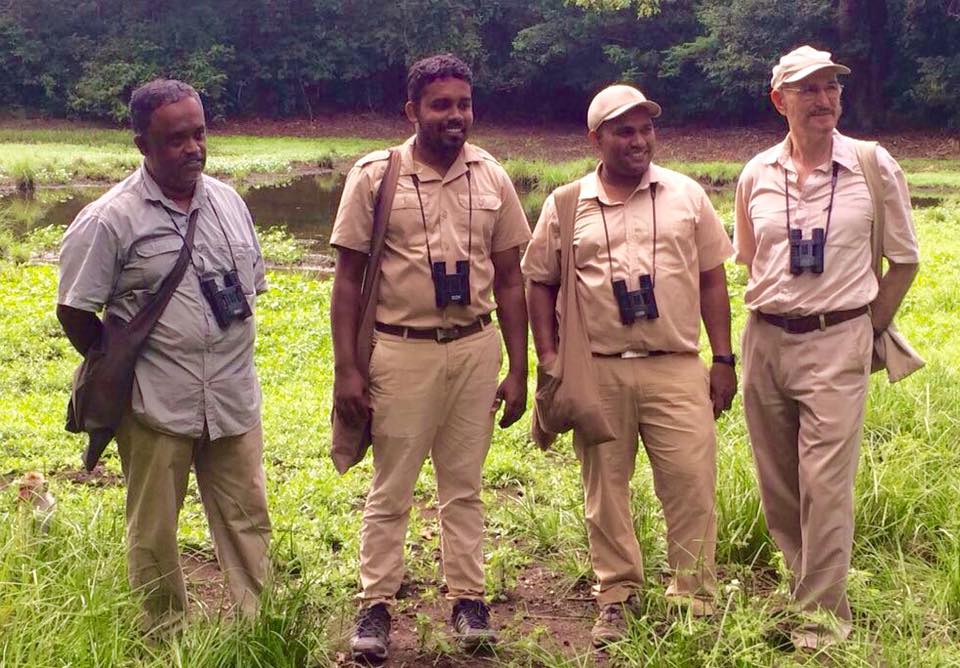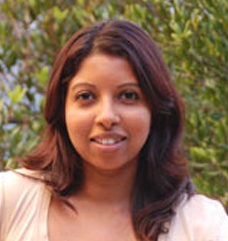Meet the Staff
We are an extraordinarily dedicated and experienced staff, internationally recognized for our expertise as scientists for field studies of primates. We are also known for our educational expeditions and for helping to popularize knowledge about primate societies through globally televised documentary films.
Our permanent staff includes the director, professional naturalists, office assistants and support staff. With the exception of the director, all personnel were born and raised in the local communities in which they are the stakeholders. We regularly supplement our personnel with professional collaborators from the local and international communities. Learn more about our collaborations
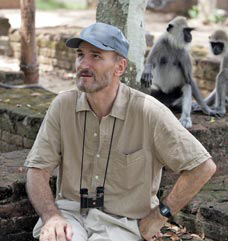 Wolfgang Dittus, PhD: Director
Wolfgang Dittus, PhD: Director
As the director, Dr. Dittus sets the scientific aims, trains others in the research methods and protocols, oversees the work, procures funding for the project, and invites students or collaborators to assist in the research effort. He also assumes responsibility for the dissemination of new scientific knowledge from the research through publications in peer-reviewed scientific journals, scientific meetings, and by way of nature documentary films. He is also active in outreach nature education and conservation programs.
Dr. Dittus had his undergraduate training and experience in geology through McGill University and the International Nickel Company (INCO) in Canada. For his graduate work he switched disciplines to biology, and his graduate education at McGill gave him a foundation in the fields of Physiological Psychology, Behavior and Zoology. He had done experimental studies on the behavioral development (nature vs. nurture) of song in cardinal birds (Richmondena cardinalis). In the USA he graduated with a Ph.D. in Zoology (Behavior and Ecology) from the University of Maryland, College Park based on his field research of toque macaques in Sri Lanka. As a post-graduate he did brief population surveys of sloths and howler monkeys in the forests of Panama.
As a boy he grew-up in the Black Forest region of south-western Germany where he acquired an appreciation for nature. This was developed further by life on Vancouver Island, British Columbia and later by many summers camping in the wilderness of the Laurentian Mountains of Quebec. He volunteered and worked in Canadian social welfare programs (Red Feather) as a boys camp leader and swimming instructor. Throughout most of career Dr. Dittus has devoted his studies and teaching focused on nature and the outdoors.
The Primate Biology Program that he leads probes questions of the roots of primate behavior from a multifaceted and interdisciplinary perspective. The long-term studies of wild primate populations that he and his co-workers engage in provide unique and original contributions to our understanding of the adaptive nature of primates and their societies.
Dr. Dittus is Chairman of the Association for the Conservation of Primate Diversity (ACPD) and is a Research Associate at the Smithsonian Conservation Biology Institute, Conservation Ecology Center, Washington DC, USA. He is also a Visiting Research Professor at the National Institute of Fundamental Studies in Sri Lanka (NIFS).
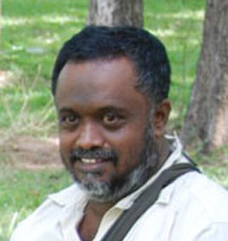 Field Crew
Field Crew
Retired affiliate: Sunil Gunathilake
Sunil joined the program in May 1986 as a Field Research Assistant; he has devoted over 30 years of his professional life to acquiring and promoting knowledge of primates and nature at Polonnaruwa. He was training in zoology and is well versed in the biology of primates and of the dry zone forest with its wildlife. He has worked mostly with toque macaques and can relate interesting details about the personal life-histories of many of them, some old-timer monkeys he would consider his “friends.” Gray langurs, too for a time, were under his watch. Sunil had broadened his experience internationally, having participated in Dr. Rudy Rudran’s (Smithsonian Institution) wildlife course in Uganda. At Polonnaruwa, he dealt almost daily with real-life issues of conservation, and this experience has motivated him to engage proactively in nature education in and around Polonnaruwa especially. He was a co-author in internationally published scientific journals in primatology.
In addition to his interests in conservation and primates, he is a keen student of Buddhism and the ancient history and archaeology of Sri Lanka. He has played a key role in the production of documentary films about primates, elephants, and other aspects of natural history. Applying his communication skills more broadly, he followed the National Tourist Guide Lecturer Course in 2009 and finished top of his class. Currently he serves as a director of the Sri Lanka Institute of National Guide Lecturers; and he is Co-Chairman of the Association for the Conservation of Primate Diversity (ACPD).
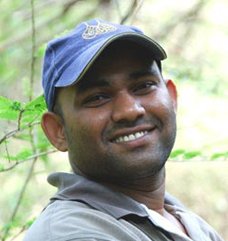 Senior Naturalist and Project Engineer: Chameera Pathirathna
Senior Naturalist and Project Engineer: Chameera Pathirathna
Chameera started work on this program in March 2003 and holds a Certificate in Wildlife Conservation and Management from the Open University of Sri Lanka. He has mastered the art of monkey studies and regularly censuses over 300 toque macaques, all of which he can distinguish individually. He can relate some interesting tales about monkeys. Chameera (along with other staff) also participates in studies of the slender lorises in the forest surrounding our research station, where we have a high density of lorises. As a true nature lover, he has nursed many wildlife patients in our animal hospice. He participates frequently in educational tours for visitors about the monkeys in our study area. Chameera also organizes regular census of water birds on the island breeding colony offshore from our research station. Film crews have come to rely on him for guidance in productions of documentary films about monkeys.
Given his technical and mechanical skills, he wears a second hat as the Project Engineer; he keeps our vehicles, generator and utilities in functional condition and he supervises the construction and maintenance of our buildings.
 Senior Naturalist and Resident Manager: Sunil Rathnayake
Senior Naturalist and Resident Manager: Sunil Rathnayake
Sunil is known affectionately also as “Deyya” (Sinhalese for ‘god-like’). He came to this program in March 2008 as Research Assistant. In his scientific assignments he monitors the demographic shifts and behavioral highlights among purple-faced langurs. These monkeys live in the tree tops, where they are often difficult to observe and therefore can pose a challenge to study. He has become expert as well in the behavior and population profiles of the toque macaques. He frequently leads educational tours for visitors and is adept in explaining the soap opera lives of the monkeys and the real science behind the drama. He also participates in studies of the loris and water birds close to our research station. He provides naturalists support to film crews collaborating with us. Sunil was raised in a rural village near the Mahawelli Flood Plains (Polonnaruwa), where wildlife (especially elephants) and humans often come face-to-face in potential or actual conflict. In his education he was a Youth Leader in his area. Sunil is a team player who brings the experience and skills of this background to the program.
He assumes a major responsibility as Resident Project Manager, which rest heavily on a variety of all-round administrative and practical skills as well as the friendly and efficient management of visitors. He is married to Nilu who also assists in the program.
Office Staff
Program Administrator: Vatsala Wijekulasuriya
Vatsala is the friendly voice at the other end of the telephone when you call our project. She has several years of successful experience in the airlines industry where handling clients helped to hone her inter-personal skills. She is with the Primate Program since 2005 and manages the logistic support for visitors; bookings for tours and accommodations. She is often busy at the “monkey camp” research station at Polonnaruwa where she had modernized general management routines, including the restaurant menus. Her additional skills with IT procedures are an asset for our record keeping, communications and financial accounting. She also assists with the collation of raw data concerning monkey behavior.

Office Assistant and Records Keeper: UHL Chandra
Chandra is in charge of our data bank. She has earned diplomas in Software Applications and Computer Programming. She began her work in July 1991, assisting in the office and doing data entries into the computer. She also transfers our field data from Polonnaruwa into digital files and re-organizes the data with the latest software. She works with records of more than 5,000 individual macaque monkeys, keeping track of their birth-dates, fates and other relevant life-history information. In the last few years she has expanded her work to include records of about 1,000 individual gray and purple-faced langurs. Her husband is our resident photographer, Palitha Handunge from the University of Peradeniya.
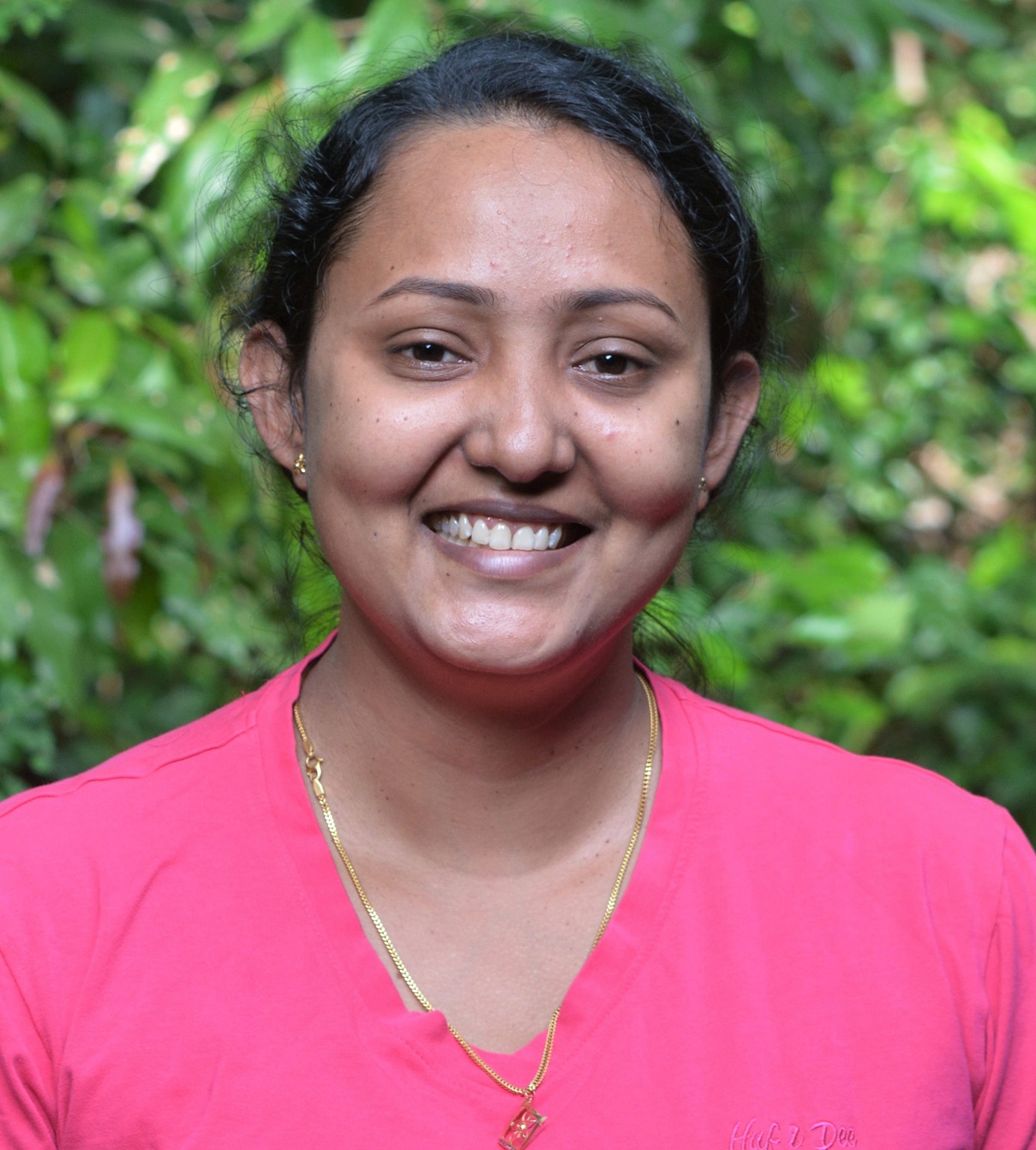 Clerical and Management Assistant: Nilusha (“Nilu”) Jayalath
Clerical and Management Assistant: Nilusha (“Nilu”) Jayalath
Nilu joined the project in November 2016 and offers significant support for all aspects dealing with the logistics of keeping the camp functioning smoothly; an all-rounder from kitchen to office. She, along with her husband, Sunil Rathnayake, operate the daily business of the camp for the greater proportion of the month. She is known for her delicious (volcanic) chilli paste that visitors like to take home as mementos of Sri Lanka.
Cooks & Housekeepers
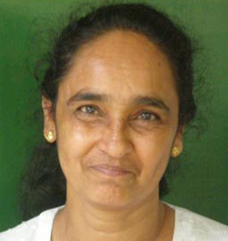 Malini Kumarihami
Malini Kumarihami
Malini started with the program in March 1999, and has since then further developed her skills as a cook. Malini also takes command of many other important tasks that keep us and our visitors comfortable at our Research Station / Primate Center Lodge. She has a much appreciated asset: a contagious smile and laughter to defeat any negative intrusions.
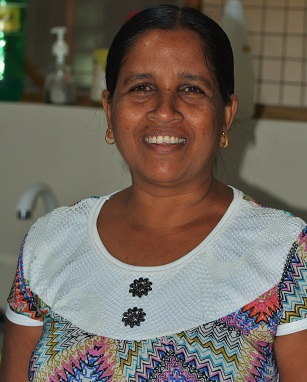 K. M. Somawathie
K. M. Somawathie
Somawathie is with us since January 2018 and brings with her experience as a housekeeper in the Middle East as well as a cook of Sri Lankan fare. She started with the program in March 1999, and has since then added variety to our menus.
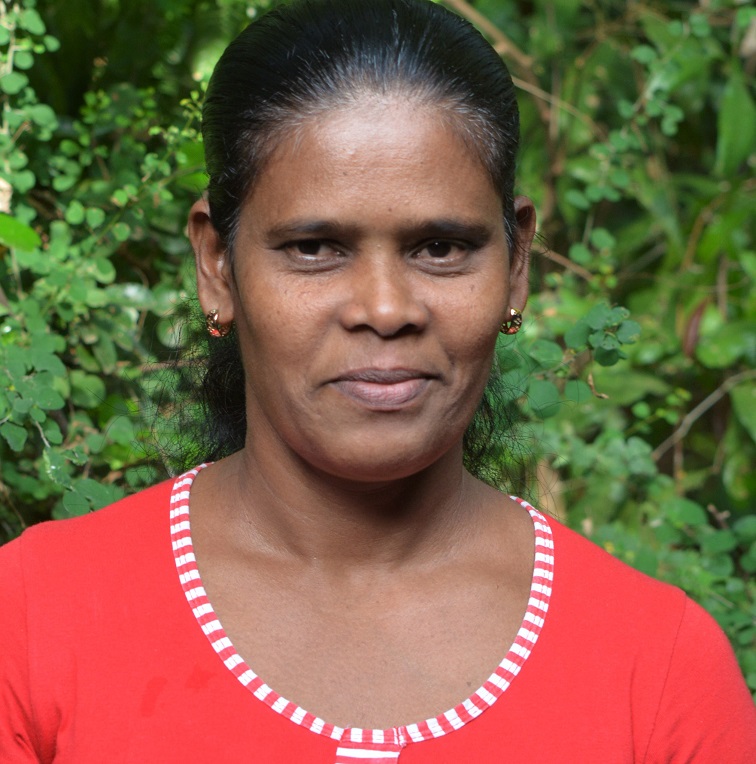 Darshika Manikkuwadu
Darshika Manikkuwadu
Darshika started with us in July 2018 and she brings the skills of the local community to our camp. She cooks an amazing “pollos curry” (embryonic jackfruit) and “kiri bath” (milk rice stuffed with caramelized coconut scrapings).

